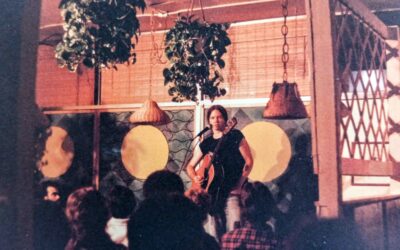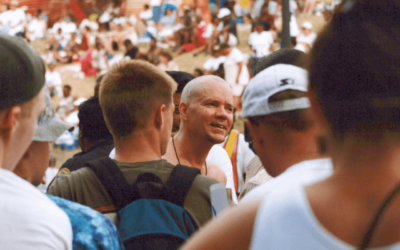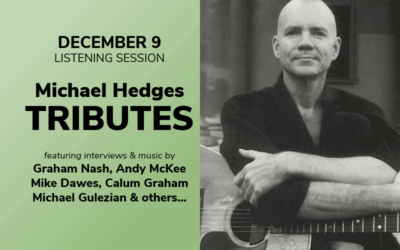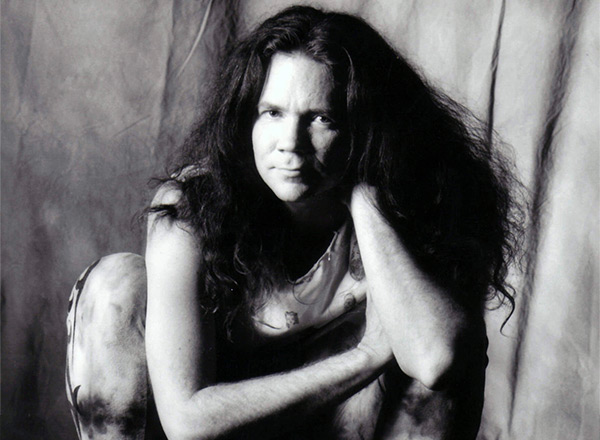by Michael Ayers
Oklahoma City, OK
May 7, 1995
Where were you on April 19, 1995, at 9:02AM?
Ask any Oklahoma City resident and they’ll tell you exactly where they were and what they were doing the moment a bomb blast shook downtown and was heard forty miles away. This is a moment in time that all Oklahomans will forever remember like, “Where were you when JFK was assassinated?” or “Where were you when the space shuttle blew up?”
Ironically, I was meditating under a tree in my backyard when an enormous blast shook my house and a pressure-wave blew across the left side of my body—a direct line thirty blocks from the blast site. My first thought was that my kundalini had raised—an experience that spontaneously happened ten years earlier with a loud “pop” that had me hovering above my body in what sounded like a roaring waterfall.
As soon as I opened my eyes I knew this was different.
My next thoughts were of “the big one.” Repressed childhood fears of nuclear bombs and memories of crouching under my grade-school desk, head tucked between knees, flooded my mind. I quickly jumped up and began looking for a mushroom cloud. Thinking the large trees in my backyard were blocking the view, I ran inside and turned on the TV. Within moments, news bulletins began reporting the horror.
Over the next several days, I felt our entire city go through the same stages of grief and loss Dr. Elizabeth Kubler Ross has so carefully documented that individuals experience with death and severe tragedies, except in this case on a much larger and collective scale. The initial stage was denial—“Not sleepy, laid-back, and conservative Oklahoma City. Why would terrorists target this city? New York City, Los Angeles, San Francisco, yes, but not Oklahoma City.” Then the fear came. Everywhere I went I sensed the panic in people’s faces. Next came the anger, helped when this disaster had a face, name, and evil philosophy. Eventually the deep feelings of sadness came and everyone seemed to know someone who was maimed or killed. At the very least this tragedy was a symbolic reminder of prior losses and deaths. I lost a friend in the explosion—a woman that resembled my late wife who died suddenly from a brain-stroke six years ago.
As fate would have it, the church which took on the responsibility of keeping a 24-hour vigil supporting relatives waiting for news of loved ones and notifying family and friends as bodies were pulled out of the rubble is located near my home. As I write this, the parking lot continues to be full of cars with newscasters and military personnel and I continue to sense the grief emanating from there. Equally strange is the fact that Timothy McVeigh’s federally-appointed attorney also lives near my home.
At any rate, the final stage (thank God!) is healing and acceptance.
Michael Hedges, being a native Oklahoman, was quick to add his support at a benefit concert yesterday.
Only several days earlier I was playing my guitar, writing a dedication titled “Lament for the Dead” for those who died in the explosion. As I was playing it, I found myself wondering what might have gone through Michael’s mind when he first heard of the bombing and how he would transpose that energy or this “feeling-tone”.
The benefit concert was initially scheduled for the Zoo Amphitheater, an outdoor arena with scalloped terrace and excellent acoustics. Due to extremely heavy rains the concert was unfortunately moved at the last minute to the indoor international building at the Oklahoma City Fairgrounds. This proved to be a poor choice due to the acoustics. The echo effect was terrible and I heard Stephen Stills complaining bitterly during the soundcheck.
I was fortunate enough to have a backstage pass and spoke briefly with Michael. He was what I assume to be his typical courteous, polite, yet somewhat timid self and did not have any words to convey for this article except to encourage me to “Write what you feel.”
Graham Nash, Stephen Stills, and Michael (on flute) played a piece by Graham titled “Half an Angel” which was composed as a dedication for the disaster victims. During his solo set, Michael gave his usual energetic and mesmerizing performance which consisted largely of material from his previous tour (in Oklahoma City only a few weeks before). It would appear he grabbed his guitar and flute and caught a plane for the benefit at a moment’s notice. His performance reminded me of his earlier shows in Norman, Oklahoma, in 1986 when he would set up his own equipment and tune his guitar himself between songs. It was somewhat humorous when he broke a string between “Jitterboogie” and “All Along the Watchtower”. Without missing a beat he quickly ran backstage, grabbed another, and retuned without breaking the flow and mood of the performance.
It was clearly a Hedges crowd and the applause was quite intense.
This is truly a world of duality and paradoxes. As painful as the bombing has been I find it interesting that I received a gift in meeting my favorite musician as a result of this incident. I also sense that Oklahomans as a whole are receiving a gift. We are more united than ever before and there is an intense bond of compassion, giving, and courage greater than I have ever experienced.
Michael Ayers is a neuropsychologist (making Oklahomans OK) and guitarist interested in swapping notes with others “wandering the acoustic frontier”. He can be reached at Michael Ayers, 520 N.W. 36 Terrace, Oklahoma City, OK 73118.
Michael Hedges – LIVE! (an online event series)
A series of online events – featuring rare, unreleased recordings, conversations with Michael’s family, friends and collaborators, and exclusive documentary clips.
“I’m Your Guitarist” (Robert Sorrenti)
I met Michael in December 1984. He had been scheduled to play at my small restaurant in Tallahassee Florida about a year earlier with Scott Cossu but had missed the plane.
25 Years Since We Lost Michael
It’s been 25 years since we lost Michael. Not a day goes by that we don’t think of him. Here’s an update on the projects we’re working on to celebrate his life and music.




